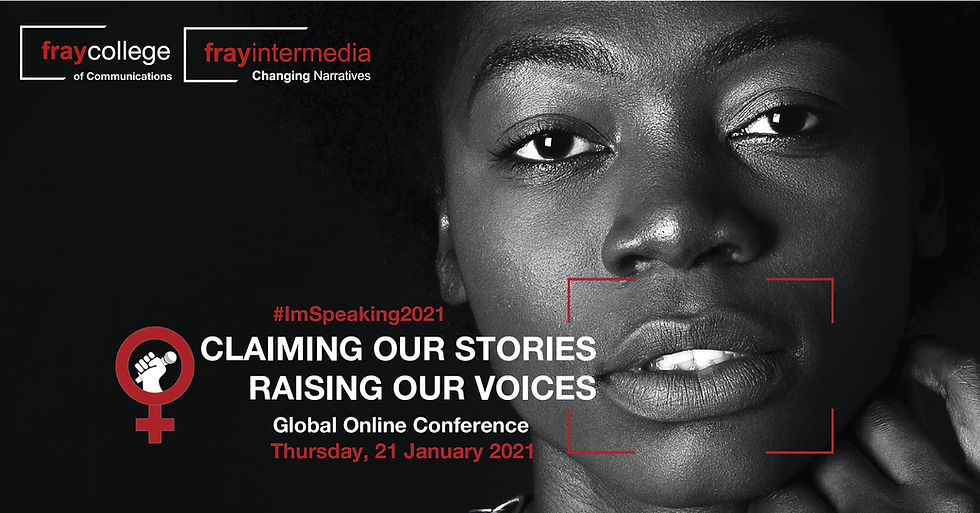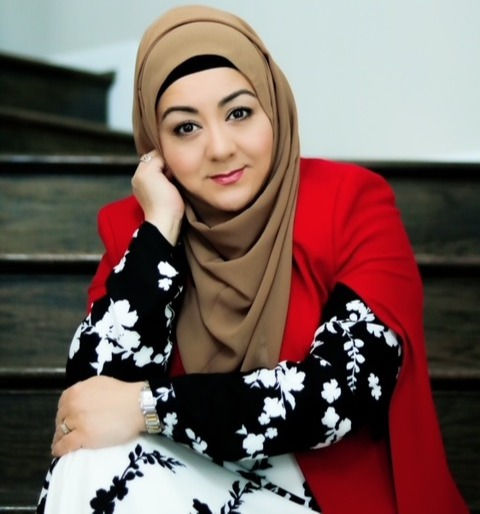Women around the world say: #ImSpeaking2021
- frayintermedia

- Jan 25, 2021
- 4 min read

Hundreds of women from around the world joined an online summit on January 21, 2021 to affirm “I’m Speaking” following the inauguration of the first African-American and South Asian woman American Vice President, Kamala Harris.
Over 40 women leaders from more than 34 countries on 5 continents gathered at the frayintermedia and fraycollege global summit “Claiming our stories, Raising our Voices” to share their experiences through presentations, case studies and panel discussions.

Keynote speaker Gulchehra Hoja, a prominent Uyghur journalist who has covered China’s detention camps, said women journalists face many threats to their work.
“If you are a female journalist exposing the crimes of an authoritarian state like China, you will definitely pay an incredible price. You face anonymous threats, forcing you to give in,” she said.
A rising price that women have to pay for being vocal is cyberbullying. Expert presenter, Dr Julie Posetti, the global director of research at the International Center for Journalists, said women, marginalised, and non-conforming people bear the brunt of online violence.
This is particularly true for women journalists who speak truth to power. A recent ICFJ study on online violence towards women says 73% of women journalists experienced online violence in their work.
“Online violence is not just harassment and abuse, it’s also about digital security and privacy threats,” Posetti said.
However, women’s physical safety is still of grave concern as 1-in-3 women worldwide will experience gender-based violence (GBV) in their lifetime according to World Bank statistics.
Tired with the scourge of GBV and femicide in South Africa, the Soul City Institute For Social Justice created the eight-part TV show “It’s a Feminist Thing”. The institute’s CEO Phinah Kodisang said the show is a means to say that violence towards women is absolutely unacceptable.
Presenting her case study, Kodisang highlighted that patriarchy enables the injustice of GBV and femicide to run wild, often scot-free.
“This system not only benefits men – it also destroys men,” she said.
While patriarchy works to benefit men, Akina Mama wa Afrika feminist and transformational leadership manager Chipo Bangira from Zimbabwe said we all need to be aware of the power and privilege that we may have. Bangira said transformational feminist leadership helps people challenge the different systems and structures that create injustice in society.
“It taught me to be aware of the power and privilege that I have. [...] How do I use my power to extend the table to bring in more women and more people in their diversities?”
Storytelling is a powerful communication tool that can help amplify people’s voices and make messaging go viral, said Eva Sander, the Accountability Lab Mexico country director. Sander added that storytelling helps focus the message often drowning in the noise of information.
“Noise is like a massive ocean so think of stories as vessels and think of them as your trojan horse. Create a narrative or story that people want to tell which carries your ideas for the ride.”
However, stories, particularly those captured in mainstream media, are often poorly told. For example, Africa No Filter executive director Moky Makura from Nigeria highlighted that with 54 sovereign states and over 3000 languages, Africa is homogenised.
“The world often sees Africa as one thing and that one thing is often stereotypical, it’s about poverty, it’s about conflict,” Makura said.
Social media is an accessible platform that people can use to reclaim their stories improperly captured by mainstream media, said Cameroonian investigative journalist Emeline Fonyuy. However she cautioned that it should be used correctly in the age of misinformation that “can drive a country to a civil war.”
In spite of the real threat of misinformation powered by social media, online platforms can shield women disempowered in real life. Although this layer of protection is thin, the option of online anonymity helps women speak out on issues such as sexual harassment said Hera Hussain, Chayn founder from Pakistan.
“I think there's a world of opportunities that the web opens for women. It's not just restricted to them accessing their rights. It's about forming online communities, finding friends that have similar opinions, but also being creative.
“And I think we should never forget that there's so much misery and violence and sadness, especially for women. So any opportunity there is for women to thrive, I think we need to celebrate it,” Hussain said.
As women get ready to reset, refresh and resist for the rest of 2021, Dr Yene Assegid from Ethiopia and the Everyonesworld Leadership Foundation director said it is important to realise that challenges are inevitable.
“Change is constant. Our capacity to come to terms with this is what makes us predisposed to accept whatever breakdown comes,” Assegid said.
Assegid highlighted that when facing challenges, resilience is more than just bouncing back. It is also about the capacity to heal and take lessons learnt “with one more layer of knowledge, wisdom and wider perspective.”
Resilience is often earned and gained through arduous circumstances and resilience is an asset that women have. This is according to Babadian Jamila Headley, Center for Popular Democracy chief of staff.
While the likelihood of facing challenges is not a “silver lining”, Headley said it builds resilience to navigate life.
“Black women, people with disabilities – we’ve been through hard things. We’ve had to deal with the world not going our way that we want it to go. We’ve had to deal with massive injustice. We know what it's like to have scarce resources and we’ve had to figure out how to make it work,” she said.
Finding the resilience to speak truth to power and for women to raise their voices in 2021 is important, considering the great challenges across the world, Hoja said. She commended women, particularly in the journalism field who take courage to challenge injustices around them by not staying silent.
“Silence is a sign of death so we need to raise our voices,” she said.
Watch conference videos on our YouTube channel.






Comments